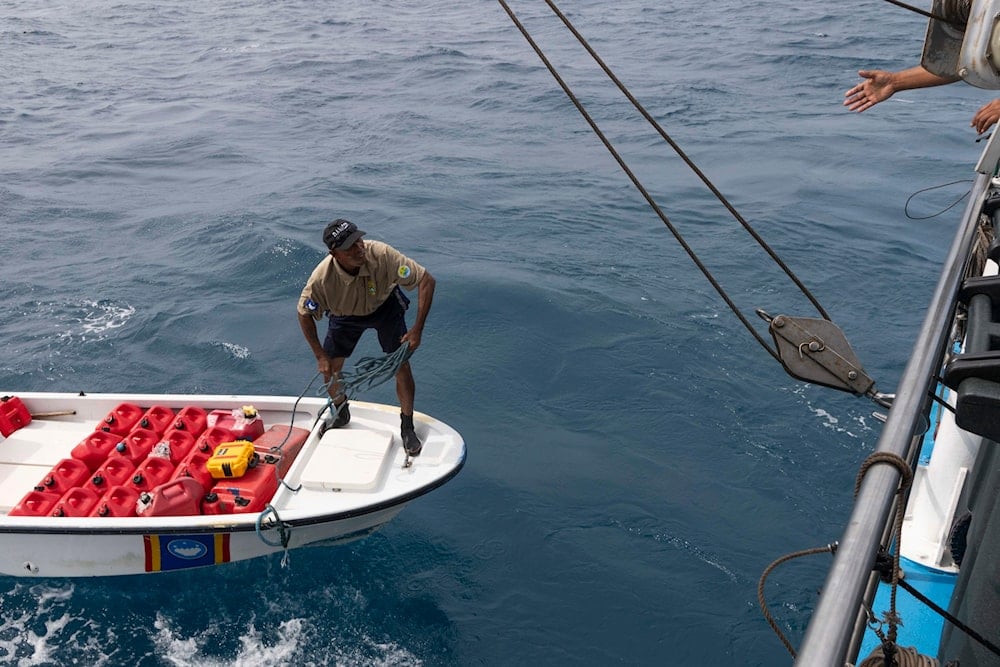Trump eyes set on tiny Palau for migrant plan under threat of aid cuts
The US is pressuring the tiny Pacific nation of Palau to accept asylum seekers it no longer wants, which critics say is a coercive tactic that shifts America’s refugee burden onto weaker allies.
-

Fred Obak, a Hatohobei State Ranger stationed on Helen Island, Palau, throws a rope to a boat as they prepare to exchange fuel cans on July 17, 2024. (AP)
The Trump administration is quietly negotiating a deal with Palau, a small Pacific island nation, to resettle asylum seekers deported from the United States, in a move that critics say reflects a broader strategy of outsourcing immigration enforcement and intimidating migrant communities.
A draft agreement, obtained by The Guardian, outlines a proposal for Palau to receive so-called “third country nationals” who fear persecution in their home countries but have no ties to the remote island. The arrangement would exclude unaccompanied minors but otherwise leaves key details, such as the number of people affected and what Palau would receive in return, intentionally vague.
“The Government of the United States of America shall not transfer unaccompanied minors pursuant to this Agreement,” the draft reads.
Palau President Surangel Whipps Jr. confirmed the proposal remains under review and said his government retains full discretion over whether to accept any individuals. In a letter seen by The Guardian, Whipps emphasized that any decision would be made with national sovereignty and humanitarian considerations in mind.
Plan raises eyebrows
But the context surrounding the offer raises serious questions. In June, a US Supreme Court ruling cleared the way for Washington to deport asylum seekers to countries where they have no family or cultural ties, a ruling that paved the way for recent removals to nations like South Sudan and Eswatini.
Now, the United States appears to be expanding that strategy across the Pacific.
“This is about generating fear,” said Doris Meissner, former commissioner of the US Immigration and Naturalization Service and director of the US Immigration Program at the Migration Policy Institute. “By targeting countries far from the US, most of which Americans have never heard of, the administration sends a message that no destination is too remote if you seek asylum.”
Wider context
Palau, an island nation of just 18,000 residents east of the Philippines, is not a party to the UN Refugee Convention, which sets global standards for refugee protection. The draft agreement acknowledges this, stating that Palau would act according to its constitution and “humanitarian principles", without international legal obligations.
Last week, President Whipps convened a high-level meeting with Palau’s National Congress and Council of Chiefs to discuss the proposed arrangement. While reaffirming the country’s “longstanding partnership with the United States,” Palauan leaders indicated they would need far more information before making any decision.
That longstanding partnership, however, also reveals a vulnerability. Palau is deeply financially reliant on US support through the Compacts of Free Association (COFA), which grants Washington military access and strategic influence in exchange for aid. In 2023, COFA-related funding accounted for roughly 30% of Palau’s total government revenue.
This dependence, experts warn, gives the Trump administration outsized leverage in negotiations.
“There’s no real benefit here for Palau,” said Camilla Pohle, a Pacific analyst formerly with the US Institute of Peace. “If they agree to this, it will be under quiet duress. There’s a real fear that saying no could put aid or programs on the chopping block.”
Pohle noted that the administration’s approach could backfire in the broader Pacific context, especially among nations deeply affected by climate change and already disillusioned by Washington’s global retreat from environmental and human rights commitments.
“This policy undercuts US credibility in the region,” she stressed.
Closer look
The proposal, however, comes amid a far more aggressive global deportation campaign. A State Department spokesperson defended the initiative, saying the US is working with partner countries “to facilitate the removal from the United States of nationals of third countries who seek asylum or other forms of protection.”
“Engagement with foreign governments is vital to deterring illegal and mass migration and securing our borders,” the spokesperson added.
Still, rights groups and analysts argue that forcibly transferring migrants to remote and legally ambiguous destinations not only erodes international refugee protections but also exposes Washington’s most vulnerable newcomers to further trauma and danger.
“This isn't border security, it’s an abdication of moral responsibility,” Meissner said.

 4 Min Read
4 Min Read










